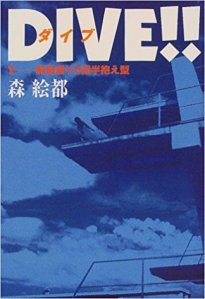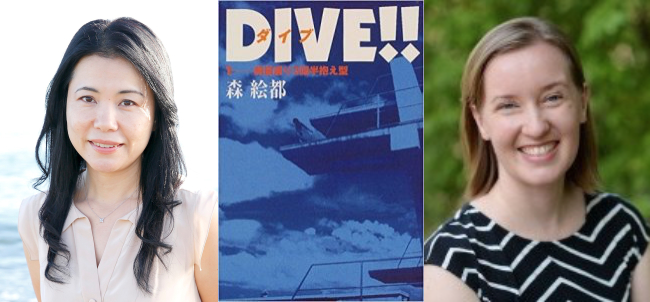May GLLI Blog Series: Japan in Translation, No. 9
Editor’s note: It’s mind-blowing how instantly global we’ve become. A little more than a week ago UK blogger Zoe Toft (Playing by the Book) posted an interview with translator Avery Fischer Udagawa, who is the contributor of today’s post. Avery, by the way, lives in Bangkok, Thailand. I am posting this piece in Seattle, on a blog that’s managed in South Carolina. And tomorrow, we feature an Australian. Check out the interview for Avery’s favorite Japanese children’s literature in translation.

DIVE!! by Eto Mori is a pacey novel about three teenage divers striving to qualify for the Olympics. Yoichi is a “thoroughbred” son of former Olympians, determined to earn his way without favors. Tomoki is a middle schooler talented beyond his years. Shibuki is a rural teen whose family were ritual cliff divers, whose grandfather lost his chance to dive at the Olympics due to World War II. The three boys train at the financially strapped Mizuki Diving Club, where the arrival of female coach Kayoko Asaki promises to turn everyone’s routine on its head—and perhaps guarantee him a future.
This title has achieved bestseller status in Japan and inspired two manga adaptations, a live action movie, and an anime series that aired in summer 2017. It is ripe for publication in English, as the 2020 Summer Olympics will take place in Tokyo.
Care to take a look? Here is the novel’s opening, which introduces the characters Shibuki, Coach Asaki, and Tomoki.
DIVE!!
By Eto Mori
Translated by Avery Fischer Udagawa
Prologue to Part I: Forward 3-1/2 Somersault Tuck
He waited for his moment.
The teen stood atop a sheer cliff that sliced the twilight sky like a knife. At its edge, some twenty meters above the surf, he could look down and see ocean roil through the gaps between his toes. He focused on the wind whipping his skin.
Few seagulls, or even crows, lingered on this cape in the dead of winter. In a season of snow and ice, when the air itself seemed frozen, fishermen ceased to fish and the ocean swelled to the horizon unspoiled by a single boat. One saw only the massive waves that broke on the rocks, their spray and mist rising, and the churning sea that now flamed crimson at sunset.
The tide smelled pungent—of living and dead fish, seaweed, rocks, trees, wet earth. The young man inhaled deeply, and then loosened the bath towel wrapped around his upper body. A shock more of pain than cold raced over his skin.
But the wind had stopped. The white towel fell straight to his feet without drifting.
Now.
Seizing the pause between gusts, he fixed his gaze on a point above the horizon, bent his knees deeply, and sprung away from the cliff.
His body defied gravity, floating before the sun in the blue-gray sky.
Then his silhouette drew an arc as he dove into the white-capped waves.
“I’ve found him.”
From a rocky area behind the cliff, a woman watched his flight through half-closed eyes.
He looked to her like a bird, soaring.
Though she shivered in the cold sea wind, her pupils sparked. When the young man entered the ocean—touching off a huge splash—her lips twisted in exultation or madness.
“No mistaking him. He’s the one.”
Part I, Chapter 1: Dive to Blue
A platform over deep blue. Each time Tomoki stood on the edge of the concrete slab jutting out from the diving tower, he fought pangs of intense regret. What have I done? He had skipped right back up those steps again, and now look where he was.
Diving from 10 meters up.
Dropping at 60 kilometers per hour.
Performing aerial acrobatics in a time of just 1.4 seconds.
The idea that someone could jump from this height, withstand the speed, and somehow do somersaults and twists before nailing the entry…insane.
He pinned his heels together and rounded his toes in the air beyond the end of the platform, and then glanced down. Don’t look down. Don’t think. If you lose your nerve, your legs will lock. Tomoki knew this, but the panic bug still bit him sometimes.
The setting sun shone in on the diving pool.
Infinite small waves crisscrossed in endless transparent paths.
Below Tomoki, what awaited him was the shapeless, senseless world of water.
When people heard that he was a diver, they inevitably asked him, “Don’t you get scared?” But most people only noticed the height of the platform. They didn’t know the real terror to be found in the water below.
Water. When you hit this restless, formless liquid moving at 60 kilometers per hour, you meet a resistance more solid than liquid, more like thin ice. If Tomoki nailed his entry, he knew he would enjoy the pleasure of piercing this barrier. Water favors the successful, enveloping them like soft gel.
But if he missed the entry? The water would body slam him. Spectators never know the extent of the shock when this happens. The diver’s consciousness wavers; his pain spawns nausea. In bad cases he sinks, temporarily paralyzed. Several times Tomoki had blacked out and begun to drown in practice, and had to be rescued by other divers and his coach.
“Tomo, what are you staring at! Are there fish swimming around in the water?” Coach Fujitani shouted from poolside.
Stop this. Tomoki looked away from the water’s surface. He peered back and saw the sunburned faces of Reiji and Ryo, waiting their turn on the tower steps.
He steeled himself, faced forward and drew a deep breath. If he were the only athlete here right now, he might beg off sick and head back down those steps. But he could never do so in front of the other divers. His coach wouldn’t allow it to begin with.
Tomoki looked straight ahead. Pooling his strength in his lower body, he focused. His mind traced through his next dive.
Reverse 1-1/2 somersault tuck.
His record was good on this dive. It’ll be OK. Everything’s fine. Rallying himself, he spread his arms wide, bent his knees in rhythm, and jumped mightily.
His body paused for a moment after he kicked into the air, and then drew a small circle behind him as he plummeted. Pointed above his forehead, his fingertips touched the water first. Then his body entered at a slight tilt, causing a splash.
His angle was off. The impact made his palms go numb. Yet as Tomoki dove deep in a cascade of foam, he felt the high for which there are no words.
The elation at conquering fear. The release of escaping tension.
The embrace of the water, be it enemy or friend.
As he hauled himself out of the diving pool, Coach Fujitani critiqued his dive.
“Your jump was lazy.
“Your shoulders are stiff.
“The dive lasts until your toenails are underwater. Never relax until it’s done.”
As Tomoki acknowledged each instruction, he felt the tower pulling him in again. With his mind clear, his skin still feeling the water, and his body the exact right amounts tired and charged, he climbed the tower again with a light step.
That moment.
In those 1.4 seconds, he had grasped something.
He wanted to make it solid, make it his.
He made for the high platform as if tracking a rare animal.
But as he placed his feet over the edge again, he felt it. The regret. What have I done? He had skipped right back up those steps again, and now look where he was.
Text copyright Eto Mori. Translation copyright Avery Fischer Udagawa. This excerpt appears on Global Literature in Libraries with permission. For more information, please contact the translator.
Up next: prolific Australian book reviewer/blogger Tony Malone on the abundance of Natsume Sōseki translations.
Eto Mori is a prominent Japanese author of adult and young adult novels, who has won the prestigious Sankei Children’s Book Award. Her fiction has been published in Catalan, Chinese, French, Korean, Spanish, Thai, and Vietnamese.

Avery Fischer Udagawa is the translator of J-Boys: Kazuo’s World, Tokyo, 1965 by Shogo Oketani and of “House of Trust” by Sachiko Kashiwaba in Tomo: Friendship Through Fiction—An Anthology of Japan Teen Stories.

David Jacobson organized this series on Japanese literature in translation. He is author of Are You an Echo? The Lost Poetry of Misuzu Kaneko, a 2017 NCTE notable poetry book. A longtime journalist, David has written news articles and TV scripts that have appeared in the Associated Press, The Washington Post, The Seattle Times and on CNN and Japan’s NHK. Since 2008, he has worked with Seattle book publisher Chin Music Press. An experienced Japanese translator, he is on the board of the Global Literature in Libraries Initiative.
And in case you missed it…
May 1: Roger Pulvers on Ishikawa Takuboku (Japan-in-Translation, No. 1)
May 2: Kathryn Hemmann on outsider stories in contemporary literature (Japan-in-Translation, No. 2)
May 3: Deborah Iwabuchi on memorable translations (Japan-in-Translation, No. 3)
May 4: Eve Kushner on kanji’s punning potential, part 1 (Japan-in-Translation, No. 4)
May 5: Eve Kushner on kanji’s punning potential, part 2 (Japan-in-Translation, No. 5)
May 7: Translator roundtable on Shiba Ryōtarō’s Ryōma!, part 1 (Japan-in-Translation, No. 6)
May 8: Translator roundtable on Shiba Ryōtarō’s Ryōma!, part 2 (Japan-in-Translation, No. 7)
May 9: Librarian Ash Brown on manga in translation (Japan-in-Translation, No. 8)



23 thoughts on “Excerpt from Eto Mori’s DIVE!!”